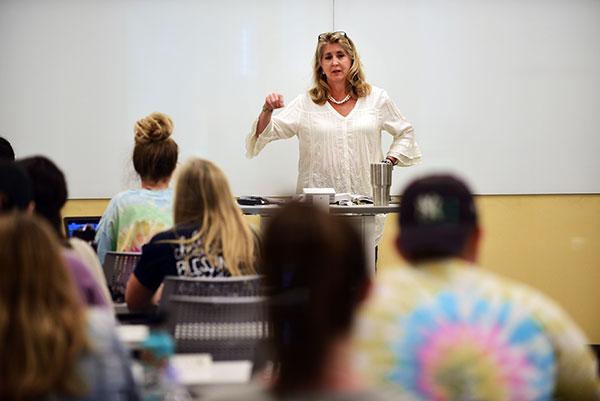Students fight for fairness in the courtroom

Each semester, around 50 students from the A. B. Freeman School of Business file into local courtrooms, eager to witness the reality and complexity of the justice system for the first time.
And each semester, their detailed notes on the efficiency and operation of the court are combined with the notes of other observers going back more than a decade, creating a resource that’s studied and cited by news organizations and political candidates, little by little bringing change and accountability to the New Orleans justice system.
“It makes you compelled to do something,” says Vishy Kandala, a junior who court-watched last spring. “You see members of your own community going through the process.”
The students are participants in Court Watch NOLA, a service-learning course that sends students into New Orleans courtrooms to help improve the city’s criminal justice system. The course is offered in partnership with Court Watch NOLA, a non-profit that tracks, observes and reports on cases in Orleans Parish Criminal District Court. The organization works to ensure that judges, prosecutors and public defenders are doing their jobs well, and it releases its findings in a report each year.
Freeman students have been an integral part of Court Watch NOLA for years. The students who participate are primarily legal studies majors, but it’s open to any student who enrolls in the Court Watch course. Students who sign up are trained rigorously before they enter the courtroom. They know what to look for and how to evaluate it.
“We judge the judges,” says Sanda Groome, a senior professor of practice who coordinates the program with Court Watch.

And the students’ work has a real impact on the New Orleans’ justice system.
“They’ve looked at what we’ve said, and we’ve made some changes,” Groome says.
Groome urges students to pay special attention during elections – that’s when their findings are most likely to be cited. Criminal courts are the most common for students attend, but they’ve watched magistrate and municipal courts too. For many students, it’s their first time in a courtroom. They get to see how a judge runs their court – and they take copious notes. If a judge is late or cancels, students note it on the yellow clipboards that distinguish Court Watch volunteers.
But students also judge the court itself. Court should be easy to understand and accessible to the public, Groome says. If something interferes with that, students take note.
The Court Watch sessions can also expose students to vastly different realities.
“You see a lot of the real world,” Groome says. “It can be an eye-opening experience.”
For Kandala, it was. She says the most meaningful part of the program was the exposure to the inner workings of the criminal justice system. She saw people held accountable and got a glimpse into the thought process behind each verdict. She reported each visit meticulously, playing her own small part in increasing transparency in the system.
“I was in some heavy court sessions,” Kandala says. “Reflecting on it afterwards definitely helped me understand the intricate details of it all.”
Sessions were virtual the past two years because of the COVID-19 pandemic, but Groome is excited to get students back in the courthouse.
For her part, Kandala urges those students to take time to process the court proceedings and understand the deep responsibility of the program.
“We hold judges accountable,” she says.
-- Martha Sanchez, msanchez2@tulane.edu
Interested in advancing your education and/or career? Learn more about Freeman’s wide range of graduate and undergraduate programs. Find the right program for you.
Other Related Articles
- HuffPost: Psychologists Say Your Airplane Seat Choice Reveals Way More Than You Realize About Your Personality
- Students network their way through Manhattan in annual Real Estate Trek
- Freeman Announces New Offerings for All Tulane Undergraduates
- Undergrads help high schoolers build investment portfolios
- Keeping it cool: MBAs help Convention Center find its temperature sweet spot
- EMBA Marine rises through the ranks
- Harvard Business Review: 5 Ways Leaders Can Communicate Power
- Three Freeman students awarded 2025-2026 Fulbright grants
